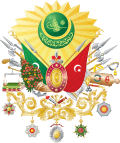Many political parties were founded in the Ottoman Empire after the Young Turk Revolution. Most did not compete in elections, instead being splinters of previously existing parties. Ethnic and Islamist parties were officially banned after 1909, though Armenian political parties remained legal until 1915.[ citation needed ] While the Second Constitutional Era basically ended after 1912, new parties were founded during the Armistice Era and up until the end of the Ottoman monarchy.
